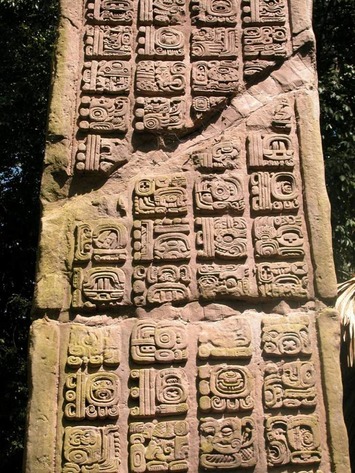One of the most extraordinary elegiac conversations of our time.
Get Started for FREE
Sign up with Facebook Sign up with X
I don't have a Facebook or a X account
 Your new post is loading... Your new post is loading...

claudia patino's curator insight,
January 16, 2014 9:02 PM
Its is amazing how the internet can help us solve ancient history. if we in the modern day are able to learn whto read Maya language then we would be able to identify some of there struggles and find out about there successe.

GoogleLitTrips Reading List's curator insight,
March 1, 2013 12:58 PM
I hesitate to begin with a question that may reveal more about my own ignorance than anything else.
Having for so long been a story passed down through generations strictly in an oral tradition, I can't imagine that there weren't many, versions of the story being told, all more or less similar at the core, but ranging in specific vocabulary used; sort of like what used to happen when we played the game called telephone. One listener, might remember the story fairly well, but memory might cause a blip or two when that listener retold the story. When the second listener retold the story more blips... and so on. And two listeners in that "first audience" might tell two slightly different blipped versions to four listeners each of whom might have told four different audiences four different blipped versions.
Recognizing that the original storytellers were far more attentive than 8 year old boys nervous about whispering into the ears of 8 year old girls, I'll assume that the source materials used in this intriguing story are "relatively" stable versions of the words that found their way into the earliest published versions of the story.
I'm actually more interested in the fact that those with non-literary educational backgrounds are bringing their talents to the study of literature. In previous scoops I've appreciated the work being done in neuroscience related to tracking brain functions when reading literature.
The vocabulary lesson described in this article as it was used by geneticists attempting to determine a possible date of the publication of the Illiad might be more interesting to a significant percentage of our students than merely looking at vocabulary as a study of prefixes, roots, and suffixes.
Anyone who has tried to maintain an interest in older literature in spite of its antiquated vocabulary knows that constant interruptions of the engaging momentum of the suspension of disbelief is not always as successful as it is annoying to many students.
Great literature does not stand alone in the real world. It is influenced and reflects history, psychology, culture, cartography, philosophy, sociology, politics, marketing, intellectual perception,... all sorts of elements beyond the siloed English Department.
As those of us who focus upon the value of literature in the 21st century valiantly come to its defense, it is essential that we not fight that good fight alone. It is too easy to dismiss literature educators as being biased in times when "practical" is a trump card in budget discussions among colleagues whose understanding of the practical impacts of the difficult to measure outcomes of literary reading is less well informed.
To be able to reference more informed views of allies coming to the defense of literary reading from beyond the English department; from the sciences and the business departments ((see: This is Your Brain on Jane Austin, The Neuroscience of Your Brain on Fiction, and "If You Want to Lead, Read") is an invaluable asset to offset assumptions of bias when we tilt at the budgetary windmills alone.
And, in gratitude, we ought to also be careful in our own contributions to the conversations when they turn to the value of supporting other curricular areas that we may find ourselves less well informed about.
~ http://www.GoogleLitTrips.com ~
Aaronee's curator insight,
February 18, 2014 6:57 PM
They traced the words on the lliad like you would do genes. They used a database of concepts and words. the word database is named Swadesh word list, and its has about 200 words that exist in everyone language and culture, like water and dog.
Gabriel Rodriguez's curator insight,
February 21, 2014 11:09 PM
Very different approach on trying to date something back to it's original creation. Can genetics be used to date back other historical treasure's also? |

Curated by Deanna Dahlsad
An opinionated woman obsessed with objects, entertained by ephemera, intrigued by researching, fascinated by culture & addicted to writing. The wind says my name; doesn't put an @ in front of it, so maybe you don't notice. http://www.kitsch-slapped.com
Other Topics

A Marketing Mix
Adventures in advertising and marketing - the contemporary, the historical, and the hysterical. http://deanna.dahlsad.com/

Antiques & Vintage Collectibles
Collecting old things; heirlooms and new to you things! Companion to http://www.inherited-values.com/

Colorful Prism Of Racism
Racism past and present. Companion to http://www.kitsch-slapped.com/category/colorful-prism-of-racism/

Consumption Junction
Consumerism meets marketing; who & what manipulates the free market of goods & services. See also: http://www.kitsch-slapped.com/category/ze-big-mouth-promotions-stuff/

Crimes Against Humanity
From lone gunmen on hills to mass movements. Depressing as hell, really.

Cultural History
The roots of culture; history and pre-history.

Dare To Be A Feminist

For Art's Sake-1
Art, crafts, and the people who make them. To inspire and purchase. Companion to http://www.ululating-undulating-ungulate.com/

Herstory
History as this woman sees it. The serious, the kitsch, the opinionated. Companion to http://www.kitsch-slapped.com/

In The Name Of God
Mainly acts done in the name of religion, but also discussions of atheism, faith, & spirituality.

Kinsanity
Let's just say I have reasons to learn more about mental health, special needs children, psychology, and the like.

Kitsch
Mostly vintage and retro "badness" but you can decide how delicious it is. http://www.kitschy-kitschy-coo.com/blog/

Nerdy Needs
The stuff of nerdy, geeky, dreams.

Readin', 'Ritin', and (Publishing) 'Rithmetic
The meaning behind the math of the bottom line in publishing and the media. For writers, publishers, and bloggers (which are a combination of the two).

Sex Positive
Sexuality as a human right.

Vintage Living Today For A Future Tomorrow
It's as easy to romanticize the past as it is to demonize it; instead, let's learn from it. More than living simply, more than living 'green', thrifty grandmas knew the importance of the 'economics' in Home Economics. The history of home ec, lessons in thrift, practical tips and ideas from the past focused on sustainability for families and out planet. Companion to http://www.thingsyourgrandmotherknew.com/

Visiting The Past
Travel based on grande ideas, locations, and persons of the past.

Walking On Sunshine
Stuff that makes me smile.

You Call It Obsession & Obscure; I Call It Research & Important
Links to (many of) my columns and articles.
|













